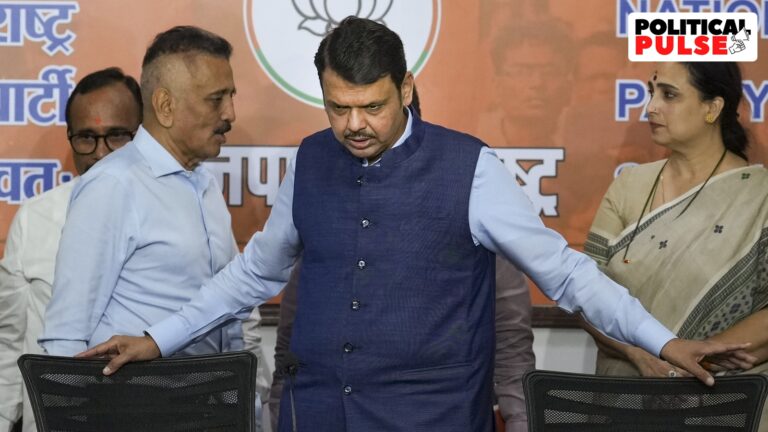The Bharatiya Janata Party fell well short of a majority in the recent Lok Sabha elections, and Maharashtra was one of the states where the party lost. The total dropped from 23 to 9..
This is raising alarm bells within the party ahead of the crucial battleground state of Maharashtra, which will hold elections later this year. To identify challenges and issues and chart a strategy, the Maharashtra BJP has convened a meeting of its district presidents and office-bearers in Mumbai on June 14. Deputy Chief Minister Devendra Fadnavis, state BJP leader Chandrashekhar Bawankule and Mumbai BJP leader Ashish Shelar are among those expected to attend and address the meeting.
The biggest challenge facing the party at present is Maratha quota activist Manoj Jarange Patil. I started indefinite fasting again He is demanding separate quota for his community in Antarwari Sarathi village in Jalna district. He is opposed to the state government’s legislation. 10% reservation for the Marathas The law covers those who fall under the Socially and Educationally Backward Classes (SEBC) category in employment and education. The law is being challenged in the Bombay High Court. Jalanji Patil believes the law will not stand up to challenges on its legal and constitutional validity. The Supreme Court had struck down a similar law enacted in 2018.
Jarange Patil has been urging the government to issue Kunbi certificates to all Marathas and provide reservation eligibility under the Other Backward Classes (OBC) category, giving them greater benefits and certainty, but the move is likely to be met with protests from OBC organisations.
A BJP insider admitted that the fast has once again put the party in a dilemma. “Some people in the party feel that there is no reason to back down and that the party should take credit for granting special leave to Marathas twice, in 2018 and 2024,” a senior BJP leader said.

Unable to win over the Marathas, the BJP lost eight constituencies in this election.Drought-prone Marathwada regionIn 2008, the party failed to win any of the four constituencies it contested. Of the parties in the ruling Mahayuti alliance, only the Shiv Sena, led by Chief Minister Eknath Shinde, won the only seat in Aurangabad. The Congress won in Latur, Nanded and Jalna, the Shiv Sena (UBT) won in Hingoli, Parbhani and Osmanabad, and the Congress (Sharadchandra Pawar) won in Beed.
With 46 seats, Marathwada is a crucial constituency for the party in state assembly elections. In 2019, the BJP won 16 of these seats, the united Shiv Sena 12, the Indian National Congress 8, the united NCP 8 and others 2.

Highlighting the challenges posed by the Maratha quota issue, Fadnavis last week said, “We were fighting three parties — the Indian National Congress, the New Communist Party (SP) and the Shiv Sena (UBT) led by the Maha Vikas Aghadi Party (MVA). But there was a fourth party which was actively campaigning in the reserved areas. We either failed to counter its campaign effectively or we overlooked it.”
Other issues
Besides reservations, the BJP will also have to find a solution to its lack of coordination with alliance partners the Shiv Sena and the NCP. That all was not well in the run-up to the assembly elections was evident from the fact that Mahayuti alliance partners were adamant for weeks on seat allocation.
“In any election, it is natural for each party to fight for maximum seats. Conflict during seat-allocation negotiations is natural in any coalition government. But once the seats and candidates are announced, grassroots support is needed. Our focus will be on improving grassroots coordination and strengthening Mahayuti,” Bawankule said.
The state BJP leadership believes that Muslim-Dalit consolidation in favour of the MVA has also hurt its prospects in the assembly elections and this issue needs to be addressed while preparing the roadmap for the state elections. A BJP leader said the Shiv Sena (UBT) had been successful in consolidating Muslim votes in the Lok Sabha elections but this had turned into a major drawback. “This paradigm shift happened when UBT leader Uddhav Thackeray compromised Hindu nationalism. Muslims supported Uddhav who compromised his core ideology to get votes.”
The party also believes that the opposition’s campaign against the BJP-led NDA, which has more than 400 MPs, claiming it poses a threat to the Constitution has worked in its favour and cost the Mahayuti Dalit votes. Fadnavis has publicly acknowledged that the Mahayuti has not been able to effectively refute this “false narrative”.
In its meeting on June 14, the BJP will analyse all the macro and micro factors that led to its poor performance in the Lok Sabha elections. In Vidarbha, considered the party’s stronghold, the party believes that the issue of agricultural distress and farmer unrest needs to be addressed. Cotton and soyabean are the main crops in the region and recent price fluctuations have hit farmers financially. While the BJP claims that international prices are responsible for the impact on the domestic market, a party leader said, “It is our responsibility to address the farmers’ issues.” The onset of the Karhu sowing season in mid-June will be the first test of the BJP’s revised strategy and outreach to farmers.

